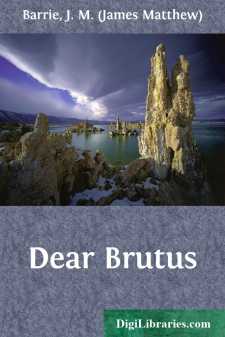Drama Books
Sort by:
by:
Bernard Shaw
ACT I On the heights overlooking the harbor of Mogador, a seaport on the west coast of Morocco, the missionary, in the coolness of the late afternoon, is following the precept of Voltaire by cultivating his garden. He is an elderly Scotchman, spiritually a little weatherbeaten, as having to navigate his creed in strange waters crowded with other craft but still a convinced son of the Free Church and...
more...
INTRODUCTION The City Bride, by Joseph Harris, is of special interest as the only adaptation from the canon of John Webster to have come upon the stage in the Restoration. Nahum Tate’s Injur’d Love: or, The Cruel Husband is an adaptation of The White Devil, but it was never acted and was not printed until 1707. The City Bride is taken from A Cure for a Cuckold, in which William Rowley and perhaps...
more...
by:
John Galsworthy
ACT I SCENE I The study of JOHN BUILDER in the provincial town of Breconridge.A panelled room wherein nothing is ever studied, except perhapsBUILDER'S face in the mirror over the fireplace. It is, however,comfortable, and has large leather chairs and a writing table in thecentre, on which is a typewriter, and many papers. At the back is alarge window with French outside shutters, overlooking the...
more...
by:
John Galsworthy
ACT I SCENE I The curtain rises on the BARTHWICK'S dining-room, large, modern, and well furnished; the window curtains drawn. Electric light is burning. On the large round dining-table is set out a tray with whisky, a syphon, and a silver cigarette-box. It is past midnight. A fumbling is heard outside the door. It is opened suddenly; JACK BARTHWICK seems to fall into the room. He stands holding by...
more...
ACT I The scene is a darkened room, which the curtain reveals so stealthily that if there was a mouse on the stage it is there still. Our object is to catch our two chief characters unawares; they are Darkness and Light. The room is so obscure as to be invisible, but at the back of the obscurity are French windows, through which is seen Lob's garden bathed in moon-shine. The Darkness and Light,...
more...
by:
John Galsworthy
ACT I SCENE I The scene is a well-lighted, and large, oak-panelled hall, withan air of being lived in, and a broad, oak staircase. Thedining-room, drawing-room, billiard-room, all open into it; andunder the staircase a door leads to the servants' quarters. Ina huge fireplace a log fire is burning. There are tiger-skinson the floor, horns on the walls; and a writing-table againstthe wall opposite...
more...
by:
Robert Browning
INTRODUCTORY NOTE ROBERT BROWNING stands, in respect to his origin and his career, in marked contrast to the two aristocratic poets beside whose dramas his "Blot in the 'Scutcheon" is here printed. His father was a bank clerk and a dissenter at a time when dissent meant exclusion from Society; the poet went neither to one of the great public schools nor to Oxford or Cambridge; and no...
more...
by:
John Galsworthy
ACT I It is Ascension Day in a village of the West. In the lowpanelled hall-sittingroom of the BURLACOMBE'S farmhouse on thevillage green, MICHAEL STRANGWAY, a clerical collar round histhroat and a dark Norfolk jacket on his back, is playing theflute before a very large framed photograph of a woman, which isthe only picture on the walls. His age is about thirty-five hisfigure thin and very upright...
more...
by:
Joseph Conrad
ONE DAY MORE SCENE I. CURTAIN RISES DISCLOSING CARVIL and Bessie moving away from sea-wall. Bessie about twenty-five. Black dress; black straw hat. A lot of mahogany-coloured hair loosely done up. Pale face. Full figure. Very quiet. Carvil, blind, unwieldy. Reddish whiskers; slow, deep voice produced without effort. Immovable, big face. Carvil (Hanging heavily on Bessie's arm). Careful! Go slow!...
more...
by:
Euripides
Introduction[1] The Electra of Euripides has the distinction of being, perhaps, the best abused, and, one might add, not the best understood, of ancient tragedies. "A singular monument of poetical, or rather unpoetical perversity;" "the very worst of all his pieces;" are, for instance, the phrases applied to it by Schlegel. Considering that he judged it by the standards of conventional...
more...











